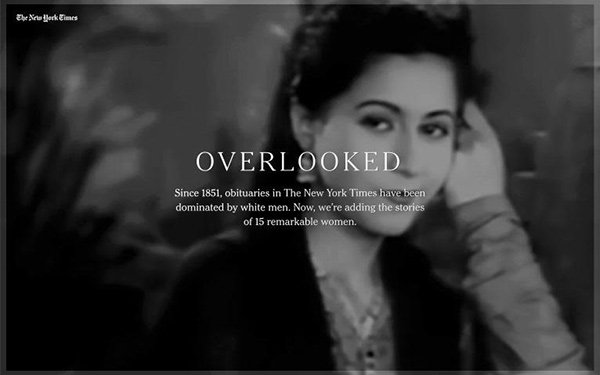
The New York Times is launching a
project called “Overlooked” to write the obituaries for those who never received them. Overlooked debuts today with the obituaries of 15 significant women, in honor of International
Women’s Day.
“Looking back at the obituary archives can provide a stark lesson in how society valued various achievements and achievers,” stated Jessica Bennett,
gender editor of The Times, and Amisha Padnani, an editor in obituaries.
Since 1851, The New York Times has published thousands of obituaries, the vast majority of
them for white men. “Even in the last two years, about 20% of our subjects were female,” Bennett and Padnani stated.
William McDonald, obituaries editor of The New
York Times, wrote the reason for this is "relatively few” women, people of color and LGBTQ people “were allowed to make such a mark on society in their own time.
Universities may have barred them. Businesses and political parties may have shut them out. The tables of power were crowded with white men; there were few seats for anyone else.”
advertisement
advertisement
The Overlooked series “recalls the stories of those who left indelible
marks, but were nonetheless overlooked.”
The initiative will continue throughout 2018, with new obituaries published every week. It will expand to include others who were
overlooked, especially people of color.
The obituaries published today include Charlotte Brontë, a novelist known for “Jane Eyre,” Qiu Jin, a feminist poet and
revolutionary who became a martyr known as China’s Joan of Arc, and Marsha P. Johnson, a transgender activist who was part of Greenwich Village street life in the 1970s.
Some of the obituaries are for famous women, like the poet Sylvia Plath, while others were more obscure, such as the first American woman to win an Olympic championship.
Padnani wrote that she began developing the idea for this series shortly
after becoming digital editor of obituaries in early 2017.
“Any time I came across an interesting person who died years ago, I searched our archives for an obit. Those who
didn’t get one were, not surprisingly, largely women and people of color,” Padnani wrote.
Readers
can use this form to suggest people that deserve an obituary in
The New York Times.